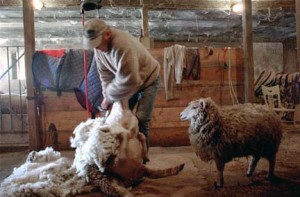Thank you for visiting The Shearer’s Yarn!
The Shearer’s Yarn was the idea and hard work of our father, David Hinman. On June 21, 2010, while shearing sheep in Hartford, Vermont, he had a heart attack and died. His death stunned us all. On June 25th, there was a large gathering of his family and friends from throughout the farming community at our home in Acworth, NH.
As his children, we would like to honor his hard work and keep the Shearer’s Yarn open.
Gwen Hinman has been shearing for years and will continue shearing flocks in the Northeast.
As our dad said, “No one knows wool like the shearer who shears the sheep.”
And indeed did he shear some sheep. Roughly 400,000 over his lifetime.
He started his own flock of sheep as a boy in Holderness, N.H., and sheered sheep and alpacas throughout the Northeast for more than 40 years. His daughter Gwen and sons Thatcher and Peter learned the art and the craft of shearing from their father, and often worked alongside him.
From the sheep he sheared and from his own flock of Blue-faced Leicesters, David selected the best wool. It is then processed into fine-quality, 100% wool yarn and wool blankets at a mill in Canada. These fine products are available through The Shearer’s Yarn website and in various yarn stores around New England. If your favorite yarn shop does not carry it, perhaps they would like to. Please tell them about us!
Why wool?
We appreciate wool and we hope you do, too. It’s a natural fiber – nothing else but dye goes into its production, not petroleum or plastic nor any other synthetic ingredient. Wool is one of the warmest fibers you’ll find. And it’s truly a renewable resource. Every year, every sheep produces a new crop of wool and at the same time helps keep fields and farmland, our working landscape, open.
Sheep help maintain another valuable Northeast resource – small-scale agriculture. Almost all sheep in this region are raised on small family farms, and are important in conserving New England’s rural tradition and way of life.


